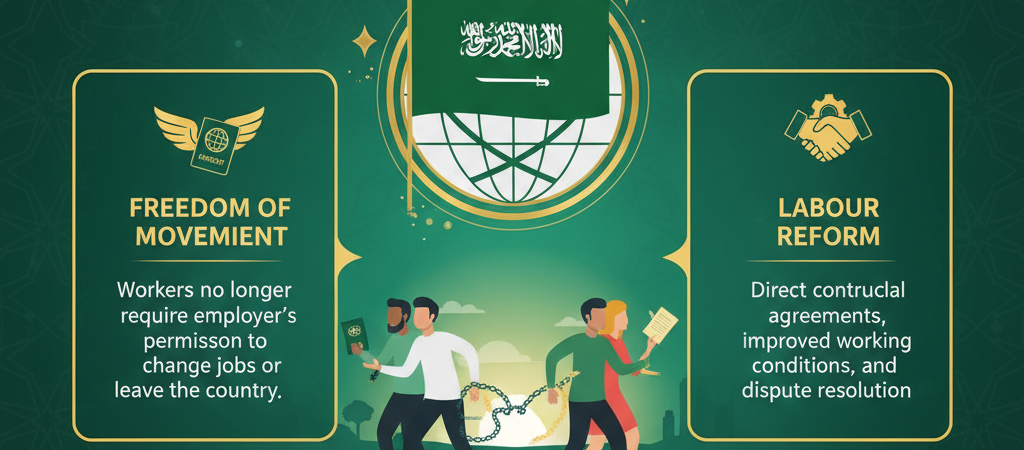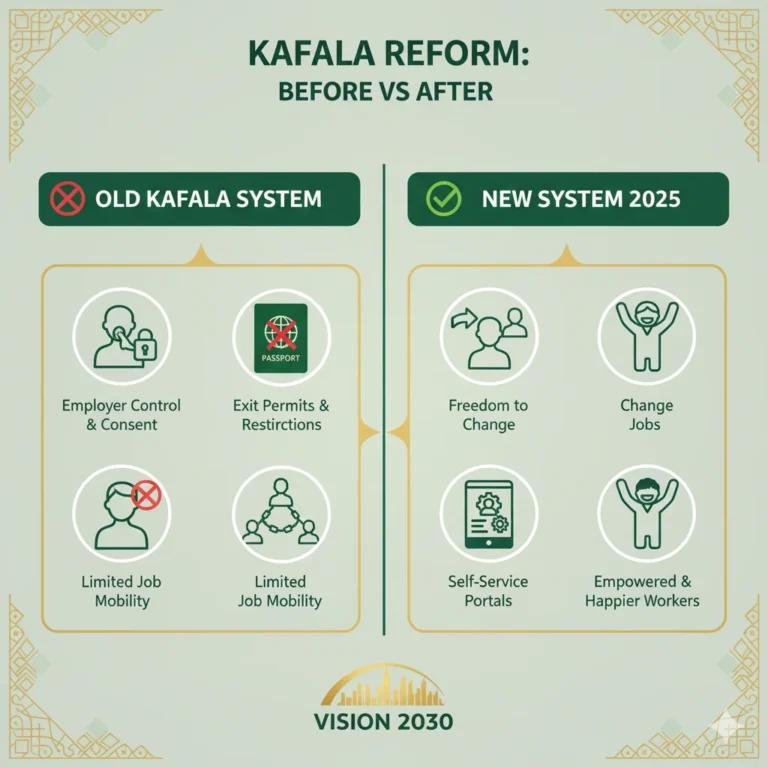Introduction
In a landmark move for labor rights, Ministry of Human Resources and Social Development (HRSD) of Saudi Arabia has officially moved to end the decades-old sponsorship model known as the Kafala system. This shift forms part of Saudi Arabia’s wider reform agenda under Saudi Vision 2030, aimed at enhancing worker rights and making the Kingdom a more attractive destination for global talent. (Source: HRSD website list of regulations)
For migrant workers, particularly from India and South Asia, this reform could be game-changing. Let’s break down what the Kafala system was, what has changed, and how this affects job aspirants and existing employees in Saudi Arabia.

What Was the Kafala System?
Under the Kafala system, foreign workers’ legal status in Saudi Arabia was closely tied to their employer (the “kafeel”). The employer had control over exit permits, job changes, and even the worker’s ability to leave the country. This setup often left workers vulnerable to exploitation.
Some of the key features included:
Employer consent needed to change jobs.
Employer approval required for exit/re-entry from Saudi.
Worker’s residency linked to employment contract with sponsor.
Why is Saudi Abolishing the Kafala System?
International pressure: Bodies like the International Labor Organization (ILO) and numerous human-rights groups flagged the Kafala system as a barrier to decent work.
Economic reform: Under Vision 2030, Saudi seeks to modernize its labor market, attract foreign talent, and improve working conditions.
Labor market needs: With large infrastructure, tourism, and services sector growth, the Kingdom needs a more flexible and mobile workforce.
What Changes With the End of the Kafala System?

According to official HRSD documentation, the new focus is on contract-based employment, improved mobility, and digital platforms.
Workers can change jobs without needing sponsor consent (in many cases).
Exit and re-entry applications can be made via digital platforms without employer approval.
Contracts are being standardized, and enforcement is expected to increase.
Agency to direct complaints and disputes has been strengthened.
While the full roll-out is ongoing, the official Ministry list of regulations marks a clear policy shift.
What It Means for Indian & Other Migrant Workers
Indian, Bangladeshi, Nepali and other South Asian workers make up a significant part of the foreign workforce in Saudi Arabia. With the Kafala system being reformed:
Job mobility improves: You may switch employers without lengthy sponsor permissions.
Fewer exit barriers: Leaving Saudi for short breaks or permanently may get simpler.
Direct recruitment attractiveness: Employers may favour workers knowing visa/residence processes are more stable.
Better negotiation power: Workers may get improved terms under contract-based employment.
Continued Areas of Caution
Though the reform is meaningful, implementation remains key. Some limitations still noted by rights groups:
Domestic workers and some service sectors may remain excluded.
Effective enforcement and worker awareness will determine real change.
Job seekers should still verify employer, contract, and visa details before finalising.
What Job Aspirants Should Do (2025 Edition)
If you’re applying for a job in Saudi Arabia now:
Check that your contract is registerable under HRSD’s digital system.
Confirm you are not locked into unfair exit/entry conditions.
Use trusted recruiters and verify their registration.
Keep copies of your contract, visa, and documents.
Watch for official portals (such as HRSD) for updates on processes.
Conclusion
The abolition of the Kafala system in Saudi Arabia signifies a major shift in migrant labor rights and job mobility in the Gulf region. For Indian and other migrant workers, this presents real opportunities in 2025 and beyond. But as with all reforms, the change will depend on strong implementation and informed job seekers.
Call to Action: For daily Gulf job updates and verified recruitment agency contacts, visit JobMinia.com.
